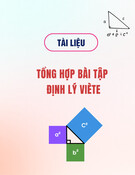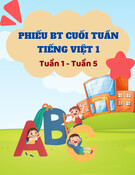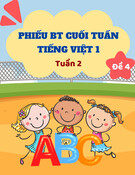
UBND QUẬN HÀ ĐÔNG
TRƯỜNG THCS DƯƠNG NỘI
ĐỀ CƯƠNG ÔN TẬP GIỮA KỲ I
NĂM HỌC 2023-2024
MÔN: TIẾNG ANH 7
A. THEORY
I. THÌ HIỆN TẠI ĐƠN (PRESENT SIMPLE)
1. Cách dùng
Cách dùng Ví dụ
Dùng để diễn tả thói quen hoặc những việc
thường xuyên xảy ra ở hiện tại.
We go to school everyday.
Dùng để diễn tả những sự vật, sự việc xảy
ra mang tính chất quy luật.
This festival occurs every 4 years.
Dùng để diễn tả các sự thật hiển nhiên, một
chân lý, các phong tục tập quán, các hiện
tượng tự nhiên.
The earth moves around the Sun.
Dùng để diễn tả lịch trình cố định của tàu,
xe, máy bay,…
The train leaves at 8 am tomorrow.
2. Dạng thức của thì hiện tại đơn.
a. Với động từ “to be” (am/is/are)
Thể khẳng định Thể phủ định
I Am + danh
từ/tính từ
I Am not + danh
từ/tính từ

He/She/It/
danh từ số
it/ danh từ
không đếm
được
Is He/She/It/
danh từ số
it/ danh từ
không đếm
được
Is not/isn’t
You/ we/
they/ danh
từ số nhiều
are You/ we/
they/ danh
từ số nhiều
Are not/
aren’t
Ví dụ:
I am a student (Tôi là một học sinh)
She is very beautiful (Cô ấy rất xinh)
We are in the garden (Chúng tôi đang
ở trong vườn)
Ví dụ:
I am not here (Tôi không ở đây)
Miss Lan isn’t my teacher (Cô Lan không
phải là cô giáo của tôi)
My brothers aren’t at school (các anh trai
của tôi thì không ở trường)
Thể nghi
vấn
Câu trả lời ngắn
Am I + danh
từ/tính từ
Yes, I Am not
No,
Is He/She/It/
danh từ số
it/ danh từ
không đếm
được
Yes, He/She/It/
danh từ số
it/ danh từ
không đếm
được
Is not/isn’t
No,

3
Are You/ we/
they/ danh
từ số nhiều
Yes, You/ we/
they/ danh
từ số nhiều
Are not/
aren’t
No,
Ví dụ:
Am I in team A?
- Yes, you are / No, you aren’t
Is she a nurse?
- Yes, she is/ No, she isn’t
Are they friendly?
- Yes, they are/ No, they aren’t
b. Với động từ thường “Verb/ V”
Thể khẳng định Thể phủ định
I/ You/ we/
they/ danh từ
số nhiều
+ V nguyên
mẫu
I/ You/ we/
they/ danh từ
số nhiều
+ do not/don’t + V nguyên
mẫu
He/She/It/
danh từ số it/
danh từ không
đếm được
+ V-s,es He/She/It/
danh từ số it/
danh từ không
đếm được
+ does
not/doesn’t

Ví dụ:
-I walk to school every
morning (mỗi buổi sáng tôi đi
bộ đến trường)
-My parents play
badminton in the morning (Bố
mẹ tôi chơi cầu lông vào buổi
sáng)
-She always gets up early
(Cô ấy luôn thức dậy sớm)
-Nam watches TV every
evening (Nam xem tivi vào mỗi
tối)
Ví dụ:
-They don’t do their homework evry
afternoon (Họ không làm bài tập về nhà vào mỗi
buổi chiều)
-His friends don’t go swimming in the
evening (Bạn của anh ấy không đi bơi vào buổi
tối)
-He doesn’t go to school on Sunday (Anh
ấy không đi học vào chủ nhật)
-Her grandparents doesn’t do excersises in
the park (Bà của cô ấy không tập thể dục trong
công viên)
Thể nghi
vấn
Câu trả lời ngắn
Do I/ You/ we/
they/ danh
từ số nhiều
+ V nguyên
mẫu
Yes, I/ You/ we/
they/ danh
từ số nhiều
do
No, Do not/
don’t
Does He/She/It/
danh từ số
it/ danh từ
không đếm
được
Yes, He/She/It/
danh từ số
it/ danh từ
không đếm
được
Does
No, Does not/
doesn’t

5
Ví dụ:
Do you often go to the cinema? (Bạn có thường đi xem phim vào cuối tuần
không?)
�Yes, I do / No, I don’t
Does he play soccer in the afternoon? (Có phải anh ấy chơi bóng đá vào cuối buổi
chiều không?)
� Yes, he does / No, he doesn’t
Do they often go swimming? (Họ thường đi bơi phải không?)
�Yes, they do/ No, they don’t
c. Wh-questions.
Khi đặt câu hỏi có chứa Wh-word (từ để hỏi) như: Who, When, Where, Why,
Which, How ta đặt chúng lên đầu câu. Tuy nhiên, khi trả lời cho dạng câu hỏi này, ta
không dùng Yes/No mà cần đưa ra câu trả lời trực tiếp.
Cấu trúc:
Wh-word + am/is/are + S ? Wh-word + do/does + S + V?
Ví dụ:
Who is he? (Anh ấy là ai?)
�He is my brother (Anh ấy là anh trai
tôi)
Where are they? (Họ ở đâu?)
�They are in the playground. (Họ ở
trong sân chơi)
Ví dụ:
What do you do? (Bạn làm nghề gì?)
�I am a student. (Tôi là một học sinh)
Why does he cry? (Tại sao anh ấy
khóc?)
�Because he is sad. (Bởi vì anh ấy
buồn)
3. Dấu hiệu nhận biết
Trong câu ở thì hiện tại đơn thường có sự xuất hiện của các trạng từ chỉ tần suất và
chúng được chia thành 2 nhóm:
⮚Nhóm trạng từ đứng ở trong câu:




![Bài tập so sánh hơn và so sánh nhất của tính từ [kèm đáp án/mới nhất]](https://cdn.tailieu.vn/images/document/thumbnail/2025/20250808/nhatlinhluong27@gmail.com/135x160/77671754900604.jpg)
![Tài liệu tham khảo Tiếng Anh lớp 8 [mới nhất/hay nhất/chuẩn nhất]](https://cdn.tailieu.vn/images/document/thumbnail/2025/20250806/anhvan.knndl.htc@gmail.com/135x160/54311754535084.jpg)




![Tài liệu Lý thuyết và Bài tập Tiếng Anh lớp 6 [Mới nhất]](https://cdn.tailieu.vn/images/document/thumbnail/2025/20250802/hoihoangdang@gmail.com/135x160/18041754292798.jpg)





